Best of Spain & Morocco Trip Notes
Trip Overview
PrintA combination of sangria, sun, and fun mixed with desert, camels, and adventure. Let us take you on this magical journey through these two different, unique, and incredible countries.
Duration : 15 Days
Destination : Morocco / Spain
Start/Ends in : Madrid / Marrakech
Group Size :13-35 People
Age Req. : 18+
Trip Theme : Discovery, Overland
Hotels : 4 Star
Depart : April to November
- * Kick-start your 15-day adventure in Spain – embracing the vibrant atmosphere, history, architecture, nightlife, and of course, some of the world’s best tapas in Madrid and Barcelona.
- * Slow down the pace as you head towards Valencia and Granada for a taste of coastal living, quaint cobblestone streets, and lavish royal palaces.
- * Save on travel time with an included international flight from Seville to Marrakech. Plus, all breakfasts, two lunches, and two dinners are included in this trip.
- * Experience the authentic Berber way of life with nightly songs and dance around a campfire during a two-night stay at a Sahara desert camp.
- * Soak in magical Saharan sunsets, enjoy including camel trekking and jeep safari across the desert or an optional quad-biking tour through the dunes.
- *Greet the Atlantic breeze at the seaside medinas of Agadir and Essaouria, both popular locations for surfing. Or if relaxing is more your scene, experience an optional – G a Moroccan Hammam bath experience in Essaouira.
Arrival Details
The group welcome meeting with your guide and other travelers is held around 18:30 at the hotel lobby on Day 1 of your tour unless otherwise notified.
Meeting Point:
The meeting point for the Best of Spain and Morocco tour is:
Hotel Mayorazgo – MADRID – 4 STAR
C. de la Flor Baja, 3, 28013 Madrid, Spain
Phone : +34 915 47 26 00
Emergency Number: +44 203 14 99 200
Finishing Point
The finishing point for the Best of Spain and Morocco tour is:
BLUE SEA LE PRINTEMPS HOTEL – MARRAKECH – 4 STAR
Address : Boulevard el Mansour Eddahbi, Marrakesh 40000
Emergency Number: +44 203 14 99 200
Highlights
Djeema El Fna: The main square of Marrakech hosts many attractions and an authentic local market. Visit fortune tellers, watch snake charmers, and make deep connections with the local life.
Marrakech: Marrakesh, a former imperial city in western Morocco, is home to mosques, palaces, and gardens. Pottery and jewelry is a symbol of the city.
Fes: Fes is a northeastern Moroccan city very often referred to as the country’s cultural capital. it is primarily known for its Fes El Bali walled medina.
Ouarzazate: The “door of the desert”, Ouarzazate is located just north of the Sahara desert. It is mainly inhabited by Berbers who built the famous Kasbahs.
M’Hamid: M’hamid is an oasis town isolated from the crowds. Hidden in the palm oases of M’Hamid are seven old and decaying Ksars. M’Hamid is also known as Bounou.
Zagora: Zagora is an amazing town in the Draa River valley in the Drâa-Tafilalet region of southeastern Morocco. It is referred to as “the gate to the Sahara”.
Agadir: Agadir is the major coastal town on the coast of the Atlantic Ocean. Agadir is famous for its summer resorts and beautiful beaches as well as the sea foods in Agadir.
Essaouira: Located on the Atlantic Coast, Essaouira is famous for the powerful trade wind blowing onto the protected, calm bay. Very popular among windsurfers!
Valencia: On the east coast of the Iberian peninsula, this magnificent city will blow your mind with its phenomenal architectural expressions and fresh-faced designs.
Barcelona: One of the largest cosmopolitan cities in the Mediterranean, Barcelona is a spell-binding metropolis bound by exquisite architecture and breezy vibes.
Granada: The cultural and historic center of Cordoba is listed as a World Heritage Site. The Alcazar Fortress is breathtaking and the Jewish neighborhood is not to be missed.
Madrid : The capital of Spain, located in the heart of the Iberian Peninsula, offers an extensive artistic & cultural heritage. An amazing city in every aspect.
Sevilla: Walk around and get lost in this Spanish city which is a perfect combination of Romani, Islamic, Gothic, Renaissance, and Baroque style architecture.
Itinerary
Please note that the itinerary may be subject to small changes depending on the conditions during the tour. Alternative accommodation of similar standards may be used depending on the group size and hotel availability.
Inclusions & Exclusions
The tour price covers the following services:
Accomodation : 4 star hotels, desert camp (Bedouin tents)
Airport Transfer : Arrival transfer on day 1 and return shuttle on the last day of the tour
Meals : 14 breakfasts | 2 lunch | 2 dinners
Transportation : A/C, modern coach or mini-bus
Guide : Services of experienced Travel Talk local guides licenced by the Ministry of Tourism
Sightseeing : Ait Ben Haddou, Zagora & M’Hamid, Agadir & Essaouira,Berber Village, Atlas Mountains, Djeema El – Fna Square, Plaza de Reina, Alhambra & Generalife Gardens
What is NOT included in the tour price?
- Any flights not mentioned above
- Travel insurance
- Meals not stated above
- Items of a personal nature
- Tips & gestures
- Entrance fees to the sights and museums
- Optional activities
- Other services not stated in the itinerary
Hotels & Accomodation
Solo travellers will be roomed with another solo traveller of the same gender in a twin or triple room or can upgrade to a solo room by paying the single supplement. You may choose the solo room option when booking online or contact us to arrange a private room.
Your tour leader will allocate rooms upon arrival at the starting hotel in accordance with the rooming lists, last minute changes may not be guaranteed.
BLUE SEA LE PRINTEMPS – MARRAKECH – 4 Star
This hotel is well located close to Plaza Square, and it has an outdoor swimming pool to offer. The Blue Sea Le Hotel is 3.5 km from Marrakech Plaza Square and city center.
CAMP SITE – ZAGORA
This camping site is an amazing place to relax and dive deep into the nomadic spirit. Get ready for once in a lifetime experience at night around the campfire and under the sky.
CAMP SITE M’HAMID
It’s only an hour driving from Zagora, located in the Sahara, this camping site is decorated Berber style, accommodation includes open-air folk shows around the campfire, traditional foods
TULIP INN OASIS HOTEL – AGADIR – 4 Star
Centrally located in Agadir and only 200 meters far from the beach, has a gym and most rooms have sea views. This hotel offers an amazing spa experience to its guests.
HÔTEL DES ILES – ESSAOUIRA – 4 Star
An ideal location at the gates of Essaouira’s old city, in front of the sea and the port, making it a great base for relaxing getaways. Built in 1948 by Antoine Marchisio.
HOTEL MAYORAZGO – MADRID – 4 Star
Hotel Mayorazgo is located very centrally in Madrid, in walking distance of Gran Via, Plaza Espana, and the Royal Palace. It has a Mediterranean restaurant and a bar.
HOTEL EXE CRISTAL PALACE – BARCELONA – 4 Star
Exe Cristal Palace is centrally located just off Barcelona’s Passeig de Gracia Boulevard. It features modern, air-conditioned rooms.
HOTEL ACTEON – VALENCIA – 4 Star
Located a few steps from Puerto de Valencia Avenue and Ciudad de las Artes Ciencias. This hotel has a design of a cheerful atmosphere.
LOS ANGELES HOTEL – GRANADA– 4 Star
This 4-star hotel is situated in the beautiful heart of Granada, next to La Alhambra’s relaxing residential area. The property also features a pool and a lounge.
Distances
Please find below the distances between the sights visited in Morocco and Spain, and the approximate driving times. We will always strive to take a short break every few hours to enable passengers to stretch their legs, purchase snacks and use wash facilities during long drives.
Ouarzazate – Marrakech: 190 Km – 3.5 hrs
Madrid – Granada: 420km – 5h
Granada – Cordoba: 201km – 2hr 45min
Cordoba – Sevilla: 132km – 2hr
Budgeting
Please note that entrance fees to sights and optional activities are not included in the tour price. Optional activities are not operated by Travel Talk and may require a certain number of attendees to run. Your guide will be happy to inform you further about the available optional activities at the start of your tour. Optional activities are also listed under each day in your tour itinerary.
Entrance Fees
Morocco
Bahai Palace — 70 MAD
Saadian Tombs— 70 MAD
Said Mausoleum — 70 MAD
Spain
Mosque Cordoba — 10 Euro
Cathedral Sevilla — 10 Euro
Optional Activities
Please note that optional activities are not operated by Travel Talk.
Moroccan Hammam — 300 MAD
Dinner Show — 250 MAD
Group Dinner — 120 MAD
TOTAL 670 MAD (approx. 80 USD)
Personal Spending
The currency of Morocco is the dirham (MAD), with bank notes found in the denominations of MAD 200, 100, 50 and 20 and coins issued in smaller values. While every traveller’s spending habits may differ slightly, we have estimated the average daily expenses to help with budgeting for your next trip. Here you’ll find the average cost for a meal or drink and advice for best practice in tipping.
Meals
Lunch at restaurant: US$ 7-10
Dinner at restaurant: US$ 12-16
Sandwich at a stall: US$ 1-2
Sfenj – Moroccan Donut: US$ 0.30
Drinks
Bottle of water: US$ 0.5
Coffee: US$ 1.5-2
Tea: US$ 1-2
Bottle of beer: US$ 2-4
The currency in Spain is the Euro (EUR). We recommend that you wait until you go to the city center to change your money. Exchange rates are usually more favorable in the city.
ATMs are available and credit cards are widely accepted, except in some small shops.
Tipping
Tipping is not compulsary, but is encouraged for good service in Morocco. The general rule of thumb is to tip 5~10% in restaurants or to private services such as porters. Your guide and driver would also appreciate this kind of gratitude at the end of your tour. For Taxi Drivers, typically rounding up the fare for convenience is recommended, as well as at market stalls.
In Spain, we recommend carrying small amounts of cash with you at all times, and adding a 10% tip to your bill if you are content with the service in the restaurants.
Shopping
Morocco is home to some of the oldest retail cultures in the world, meaning there’s no shortage of souqs waiting to be explored. Haggling in Morocco is expected and welcomed. You’ll notice prices are not often listed on items in the souqs, so evaluate what you’re willing to pay and come prepared to bargain with the shopkeeper – it’s all part of the fun!
Leather Goods
Moroccan leather is highly unique and the centuries-old tanning techniques are still practiced across the country today. The most famous tannery is Chouara Tanner of Fez, making it the perfect place to purchase quality, hand-crafted leather goods including slippers, bags, jackets, belts and wallets. Prices for leather goods start at approximately 10 USD.
Berber Rugs
Berber rugs and carpets are traditionally the craftwork of nomadic women from the Middle Atlas region and date back to the 2nd century BC. They are made from virgin wool from the sheep and can be found in souqs across Marrakech in all shades, sizes and shapes. Rug shopowners will encourage you into their store with the offer of tea, but feel no obligation to buy. Rug prices may range from 50 to 1,000+ USD.
Argan Oil
Used by the local Amazigh people for its healing properties, Argan Oil is immensly popular in Morocco. It is common to see women sitting on the front step of beauty shops crushing the kerns of the argan tree into paste, which is sold cosmetically for its healing properties to skin and hair. The regions surrounding Essauira and Agadir are the only places in the world where the specific tree grows. In this region you can purchase a quality 150ml bottle of the oil for approximately 20 USD.
Travel Advice, Visas & Insurance (Morocco)
Travellers from the United Kingdom, Australia, New Zealand, USA, Canada, Ireland and Germany do not require a visa to visit Morocco for up to 90 days. South Africans require a visa in advance, which can take several weeks to obtain.
Please ensure that you check with the Moroccan Embassy or Consulate of your country for up-to-date visa information. You may visit the consular website for the latest information: https://www.consulat.ma/en
Passport validity entry requirements: The validity of the passport or travel document must be longer than the duration of stay. We generally recommend to have a passport or travel document that is valid for at least 6 months’ from your travel date
Passport validity entry requirements: Travellers entering Morocco must also carry a passport or travel document valid for at least 6 months from your arrival date.
Travel Advice, Visas & Insurance (Spain)
If you are a European citizen, you don’t need to obtain a visa to enter Spain, as it is a European country included within the Schengen area. For stays shorter than three months, the citizens of the following countries do not require a visa: USA, Canada, Australia, New Zealand, and Japan. Please check the specific requirements for your nationality before planning a trip to Spain.
Your passport needs to be valid for at least 6 months from your arrival in Spain, and you should carry your passport or travel document with you at all times.
Check with your embassy or your official government website for foreign Spain travel advice. Bear in mind that the information we provide is for guidance only, and you are advised to check the details as it is your responsibility to have all the official documents ready before traveling.
This information is provided as guidance, we strongly advise that you check with the consulate or embassy as this information can change. Please note, that visa costs can change at any time and with little notice depending on the political climate of the region. It is your responsibility to make sure that all the required travel documents are ready when traveling. For more details, visit our Morocco travel advice and Spain travel advice pages.
Travel Advice
We are closely monitoring the latest travel updates to Morocco and Spain and follow the advice of the UK Foreign Office (FCDO). For the latest travel advice from the UK Foreign, Commonwealth & Development Office, https://www.gov.uk/foreign-travel-advice/morocco and https://www.gov.uk/foreign-travel-advice/spain
We recommend all travellers to check their Government National Travel Advisory prior to their departure:
Australia – https://www.smartraveller.gov.au/
Canada – https://travel.gc.ca/
New Zealand – https://www.safetravel.govt.nz/
USA – https://travel.state.gov/
Travel Insurance
All passengers travelling with Travel Talk are required to have personal travel insurance before participating in any of our tours. Your guide will collect your travel insurance details on the first day of your trip. It is your responsibility to make sure you have an adequate and suitable travel insurance for you in place, you may read more at https://www.traveltalktours.com/travel-insurance
Health & Safety
The health and safety of our passengers, staff and communities visited is of utmost priority. As we monitor and comply with the official advice from the UK Foreign Office, as well as World Health Organization and government authorities regularly, we have implemented several policies and precautions on our tours for your wellbeing. You may find our Safe Travels Protocols at https://www.traveltalktours.com/safe-travels
Travel Talk Adventures has received the Safe Travels stamp by the World Travel and Tourism Council (WTTC), which allows travellers to recognise companies around the world that have adopted health and hygiene global standardised protocols – so consumers canexperience ‘Safe Travels’.
Please make sure to regularly check your Government’s travel advice before travelling and be well-informed of any requirements. Your tour guide will also notify you of the regulations and protocols to follow throughout your trip with us.
Please note that if any traveller is unable to complete the itinerary or possess a potential risk to themselves and/or the rest of the group, we reserve the right to remove them from all or part of a trip.
Please consult with your doctor for the latest medical travel information and any vaccinations you may need. We recommend that you bring any personal medical requirements and medications with you as these may be difficult to obtain while on tour.
Weather
The Moroccan climate varies according to season and region of the country. The Atlantic coast experiences minor temperature variations with 30°C summers and a warm Mediterranean climate all year round. November through to March sees the most rain fall in the coastal areas. Meanwhile, the climate in southern Morocco and inland can become more extreme with hot days and almost no rain. We strongly recommend bringing a set of light-weight long clothing, sunscreen, sunglasses, and hat to protect yourself. Overall, the best time to travel is considered March to June and September to December.
Check out our weather guide for the best time to visit Morocco.
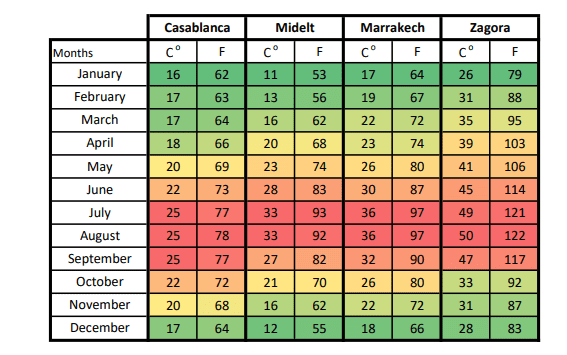
The best time to visit Spain is from June to August in the high season, when the sun is shining in full force, the Iberian coast is brimming with life, and a cultural experience is most promising. The weather is hot and dry throughout the season, with an average temperature of 30°C. Temperatures climb up to 36°C at the heart of Andalusia while the sea breeze provides a refreshment around Barcelona. Pack light clothes and enough sunscreen if you are planning a trip to Spain in the summer. The lack of humidity will make walking tours in Spain’s world-famous attractions enjoyable.
Summer is also the best time to visit Spain for the ultimate cultural experience, as the entire country is under the magical influence of slow living. Party it out in the Spanish way, or enjoy serene evenings accompanied by the Spanish guitar.
Money Matters
The dirham (MAD) is the official currency of Morocco, with bank notes found in the denominations of MAD 200, 100, 50 and 20 and coins issued in smaller values.
Major credit and debit cards are widely accepted in most cities and tourist sites across Morocco. However, if you are travelling off the beaten track, come prepared with a small stash of cash on hand for inexpensive purchases at local markets, souqs or for entrance fees and small meals. ATMs can be easily found in many places across the cities, however, are not as common in rural areas. We recommend you do not exchange bulk sums of money at the airport, as the exchange rates are usually more favourable in the major cities. Your tour leader will be happy to help if you need any assistance
Please remember that everyone has different spending habits, some prefer to spend more on souvenirs, some on experiences and others on a night out! Make sure to budget your trip to your spending habits for shopping, drinking, and tipping.
The currency in Spain is the Euro (EUR). We recommend that you wait until you go to the city center to change your money. Exchange rates are usually more favorable in the city.
ATMs are available and credit cards are widely accepted, except in some small shops.
We recommend carrying small amounts of cash with you at all times, and adding a 10% tip to your bill if you are content with the service in the restaurants.
Eating & Drinking
Morocco
Moroccan cuisine carries an exciting blend of Mediterranean, Middle-Eastern, West African and Berber influences. The typical diet is quite healthy and incorporates plenty of vegetables. Moroccan cooking is strongly characterized by the subtle blending of spices, and Moroccans expertly use them to enhance, rather than mask, the flavor and fragrance of their dishes. Searching for unique and authentic dishes can often be overwhelming if you’re not a local, so here’s a few must-try dishes to get you started in Morocco.
For more, check out our Morocco Food Guide.
Tagine: The famous slow-cooked Moroccan stew takes its name from the traditional clay or ceramic dish it is traditionally cooked in. The ingredients are arranged in a conical fashion and left undisturbed to cook until tender. Tagine is traditionally eaten straight from the cooking vessel.
Couscous: Originally from Morocco, Couscous is small balls of soft wheat or barley flours that are steamed in a pot. The traditional North African dish is typically served with meat or vegetable stew and is often eaten using your hands.
Zalouk: Zalouk is a common side dish of crusty bread and spread made from eggplants, tomatoes, garlic, olive oil and spices
Harira: Used during Ramadan to break the fast at dusk, Harira is a hearty, traditional Moroccan lentil soup.
Khobz: Typically baked in communal wood-fired over and served with an array of meals, this crusty bread is a must-try in Morocco.
Mint Tea: A grean tea base with lots of mint leaves and sugar, making for a refreshing drink
Pastilla: A traditional pigeon meat pastry made from dozens of different layers of thick flaky pastry.
Baghrir: Usually eaten at breakfast, these bubbly, sweet pancakes are a standout for many travellers to Morocco. What makes them different to Western pancakes is that they are made with semolina, thinner than flapjacks but thicker than crepes.
Chebakia: Soaked in the syrup of honey and rosewater, then sprinkled with sesame seeds – this sweet, fried pastry can be found in many corner shops and bakeries, especially during Ramadan.
M’hanncha: Translating to ‘coiled like a snake’, this large, coiled sweet pastry is meant to be shared. It can be cut into smaller pieces and pulled apart to reveal almond paste, pistachios and a sugary paste
As well as the traditional dishes there are also a lot of western style foods available in the larger cities. Kebabs can also often be found in many souks or stalls and are generally served with a spicy sauce.
Morocco’s national drink is mint tea, a green tea flavoured with springs of mint and sweetened with large amounts of sugar. Also common at cafes and street stalls are a range of freshly squeezed juices and mixed fruit milkshakes! Moroccan tap water is usually considered as safe to drink, however may upset your stomach if not used to it. Hence, we would recommend drinking bottled water which is readily available throughout the country. Morocco typically gives drinking alcohol a low profile, but bars in most tourist areas stay open to late and wines, beers and spirits are widely available with laws around alcohol liberal for visitors. Local beers are relatively inexpensive and a few worth trying include Flag, Stork and Casablanca.
Spain
Spanish cuisine is exotic, diverse, and as colorful as the country’s culture. Blending culinary traditions from the 17 autonomous communities within its borders, it makes use of olive oil and regional herbs such as thyme and oregano. Garlic is also an irreplaceable ingredient in Spanish dishes. As you travel across the cultural regions of Spain, you will find unique culinary accents that reflect the communities. Believe it or not, Spanish cuisine is much more than the iconic paella and exciting tapas, and we are here to get you familiar with the best dishes in Spain.
For more, check out our Spain food guide.
Tortilla de Patatas: A quintessential Spanish dish and breakfast staple, tortilla de patatas knows how to satisfy the palate with its plain but incredible taste. It is a potato omelette and you will hear loads of ideas when it comes to cooking it with or without onions.
Paella: The first recipe of paella includes rice, rabbit, chicken, and duck meat. Much simpler versions are at the top of the menus in every Spanish restaurant today. Paella de marisco is one that you should try if you are into seafood.
Spanish Chorizo: Dry or deep-fried, these pork sausages are a common ingredient in Spanish everyday cooking. It gives some of the most iconic main course dishes their distinctive qualities.
Chocolate con Churros: Churros is deep-fried dough sticks coated in a mix of cinnamon and sugar and dipped in hot chocolate sauce.
Sangria: Slices of orange, lemon, and apple are chilled in a jug of Rioja wine. The traditional recipe may also include blueberries, grapes, and other fresh fruits.
Essentials to Bring & Internet
-Face mask/cover and hand sanitiser enough for your personal use throughout the trip – See more at https://www.traveltalktours.com/safe-travels/
-Travel Documents: Passport, Visa (if required), flight or transport ticket (and photocopies)
-Travel Talk Tour Voucher (printed or digital)Travel Insurance Policy (and photocopy)
-Personal medical kit and medicine
-Money (cash, credit card, travellers’ cheques)
-Power Adapter
-Reusable water bottle
-Ear plugs and eye mask
-Sun protection – hat, sunglasses, sunscreen
-Comfortable, closed walking shoes
-Wind/water proof jacket
-Warm clothes, hat, and gloves for cold weather
-Sandals, swimwear, shorts for warm weather
Important: If your tour runs in the months from November to March, we recommend you bring a sleeping bag with you as the weather can be cold at night time (especially in the desert).
Internet Access
Most cafes, hotels and restaurants in large cities of Morocco and Spain provide free Wi-Fi, but the connection may be spotty or slow. If you wish to use your own 3G/4G Data, be sure to enable data roaming on your mobile. Purchasing a Moroccan or SpanishSIM card for the duration of your tour may be a cost-effective alternative. Make sure that your phone is unlocked before you leave home so a local SIM will be compatible. Your guide will be happy to advise on this.
Religion, Etiquette, and How to Dress
Morocco
Morocco is a tolerant, yet traditional nation with strong cultural values. Religion is a crucial factor in the life of Moroccans, and it is intermingled with daily activities. It is estimated that more than 98% of the population is Muslim, and the way people dress and interact with each other is influenced by religion. The religious holidays of Ramadan and Eid are the most significant events for Muslims. A wide array of cultural norms, including how people dress and interact with the opposite sex, are influenced by such. Especially in rural areas, conservative clothing may be preferred.
As a general guideline, we recommend wearing loose-fitting, comfortable clothing and walking shoes while travelling in Morocco. Please also keep in mind that when visiting religious sites, appropriate attire is required. It is recommended to pack at least one set of modest clothing that covers both shoulders and knees, to be worn when visiting mosques and other religious complexes. A headscarf for women is necessary when visiting religious complexes in Morocco. Access to certain mosques and holy places is forbidden to non-Muslims, much to the disappointment of many tourists.
Spain
The majority of Spain is Catholic, and Spanish people often see Catholicism as a deep-rooted tradition. Catholic culture is the main driving force behind celebrations and holidays in Spain. You will witness several rituals and events taking place in the Catholic churches all across the country, which are also must-visit places for the ultimate Spanish experience. When visiting religious sanctuaries, pay attention to cover your shoulders and knees, but keep in mind that there is not a strict dressing code in Spain. Also, Try to practice caution when speaking about the daily routines and schedules of Spanish people with locals.
Solo Travellers
We have many solo travellers joining our tours. Solo travellers will be roomed with another traveller of the same gender. If you would like a private solo room, please contact us. You may see our solo travels page for more details.
Rules to Follow
We are committed to ensuring a safe and enjoyable experience for everyone. We do not tolerate any form of violence (physical or verbal), bullying or harassment involving customers, partners, Travel Talk staff or locals. Sexual relationships between a tour leader and a passenger are forbidden.
We will not tolerate any illegal activity, including but not limited to: use and possession of illegal drugs, trespassing, and disrupting public order. If you consume alcohol, please ensure that you drink responsibly and follow the local laws and regulations.
You must follow the advice of your tour leader and local officials regarding health and safety measures. We operate all tours under Safe Travels protocols for the wellbeing of our passengers, staff and communities visited. Please ensure that you have read the https://www.traveltalktours.com/safe-travels/ and are fully prepared for your trip.
If someone is acting inappropriately regarding these matters, please notify your tour leader immediately or contact us on the emergency contact number provided below.
Your tour leader has the right to remove from the group anyone not abiding by these rules, with no right of compensation or refund. See more at https://www.traveltalktours.com/booking-terms/
Please remember that our travellers come from different parts of the world and will have various needs and preferences. Be understanding and patient with your fellow travellers, and always strive to be on time.
Responsible Travel
We believe that travel is a force for good and show our support through various initiatives and charity organizations, as well as keeping the principals of responsible and sustainable travel at the core of our ethos. These values are engrained in our business culture and the design of our trips just the same. Together with you, we strive to make a positive impact on local people and economies, respecting the local culture, environment, social fabric and customs; encouraging respectful and meaningful cross-cultural exchange. Read more at https://www.traveltalktours.com/responsible-travel/
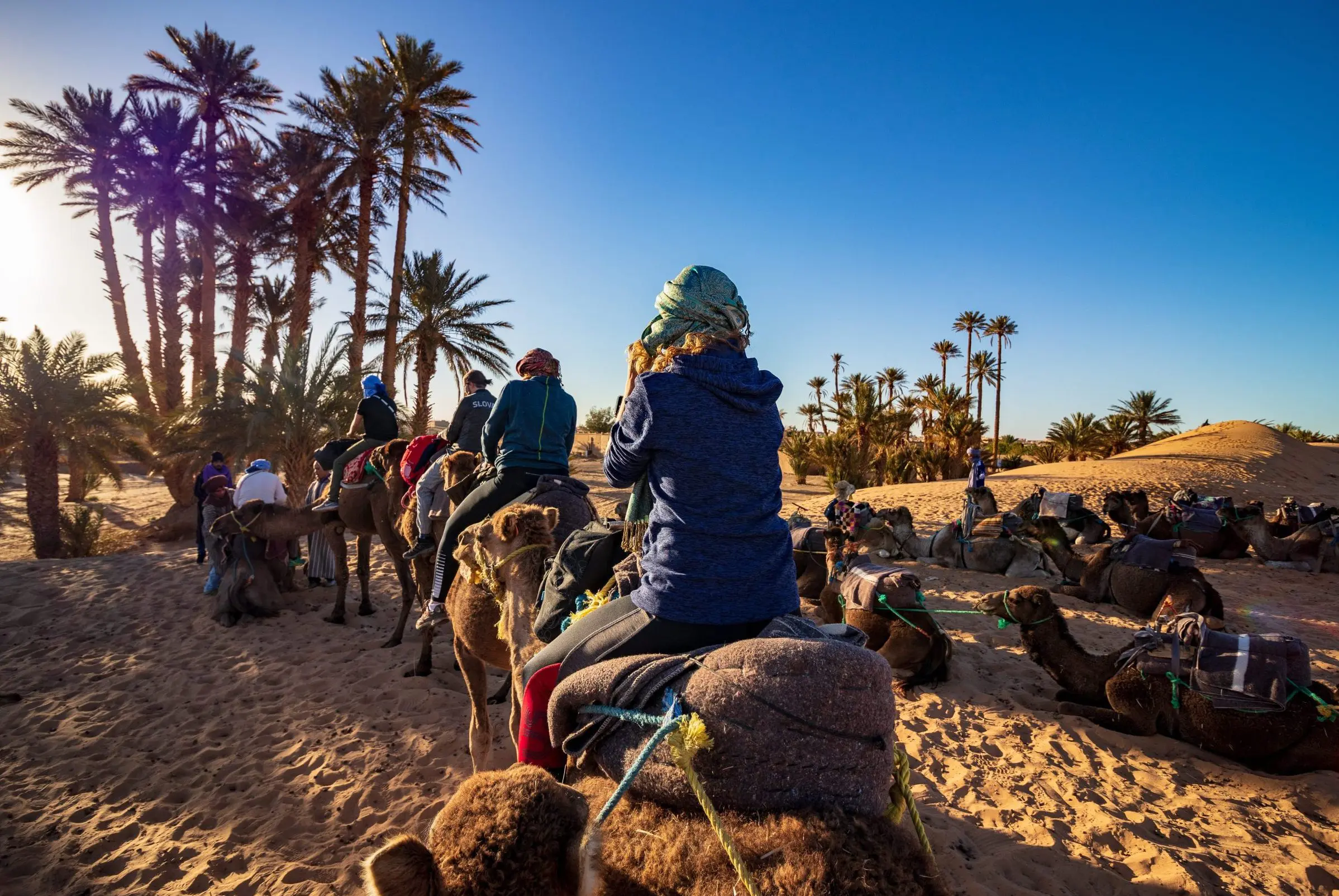 Summer Sale: 45% Off
Summer Sale: 45% Off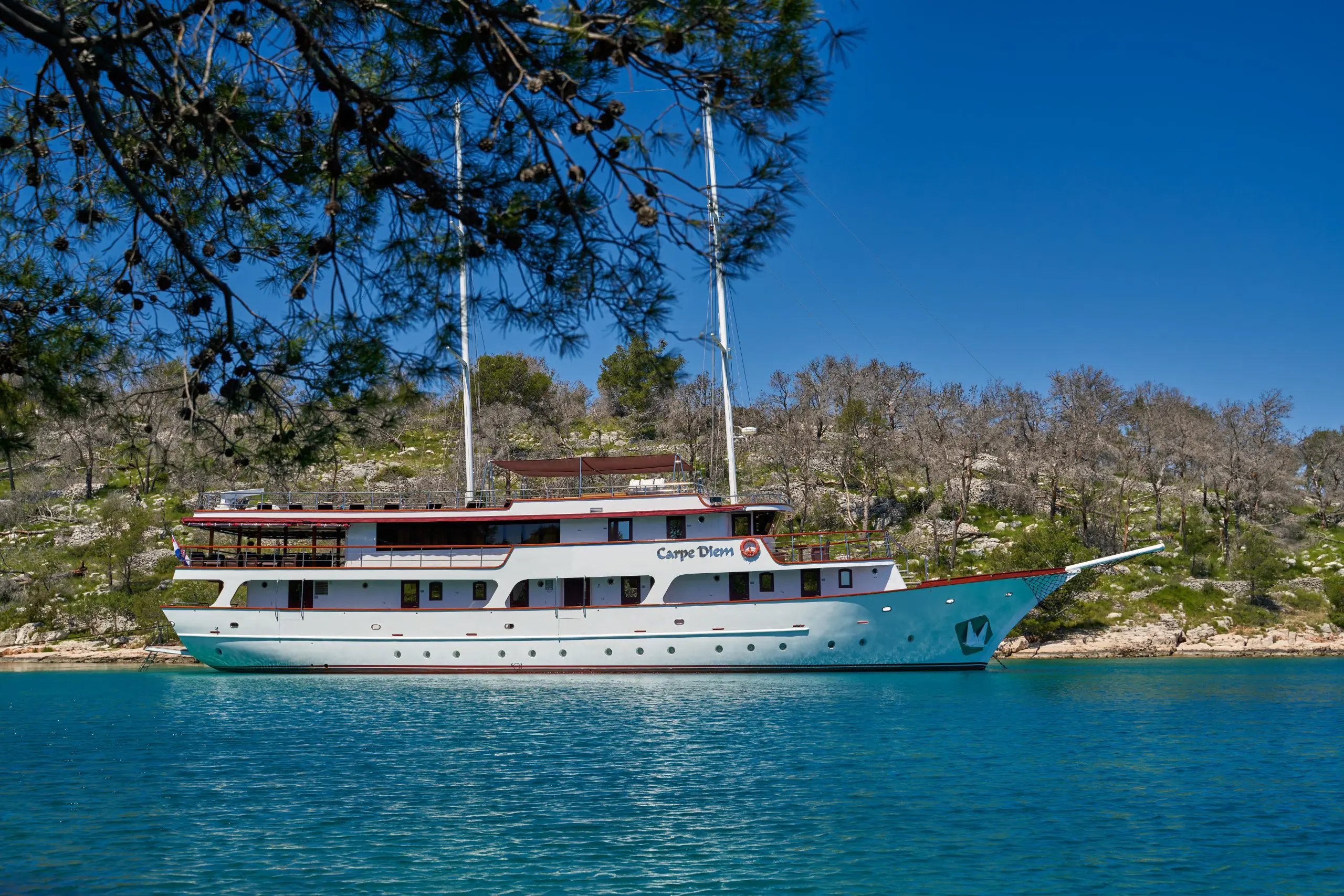 Croatia Sailing : 45% Off
Croatia Sailing : 45% Off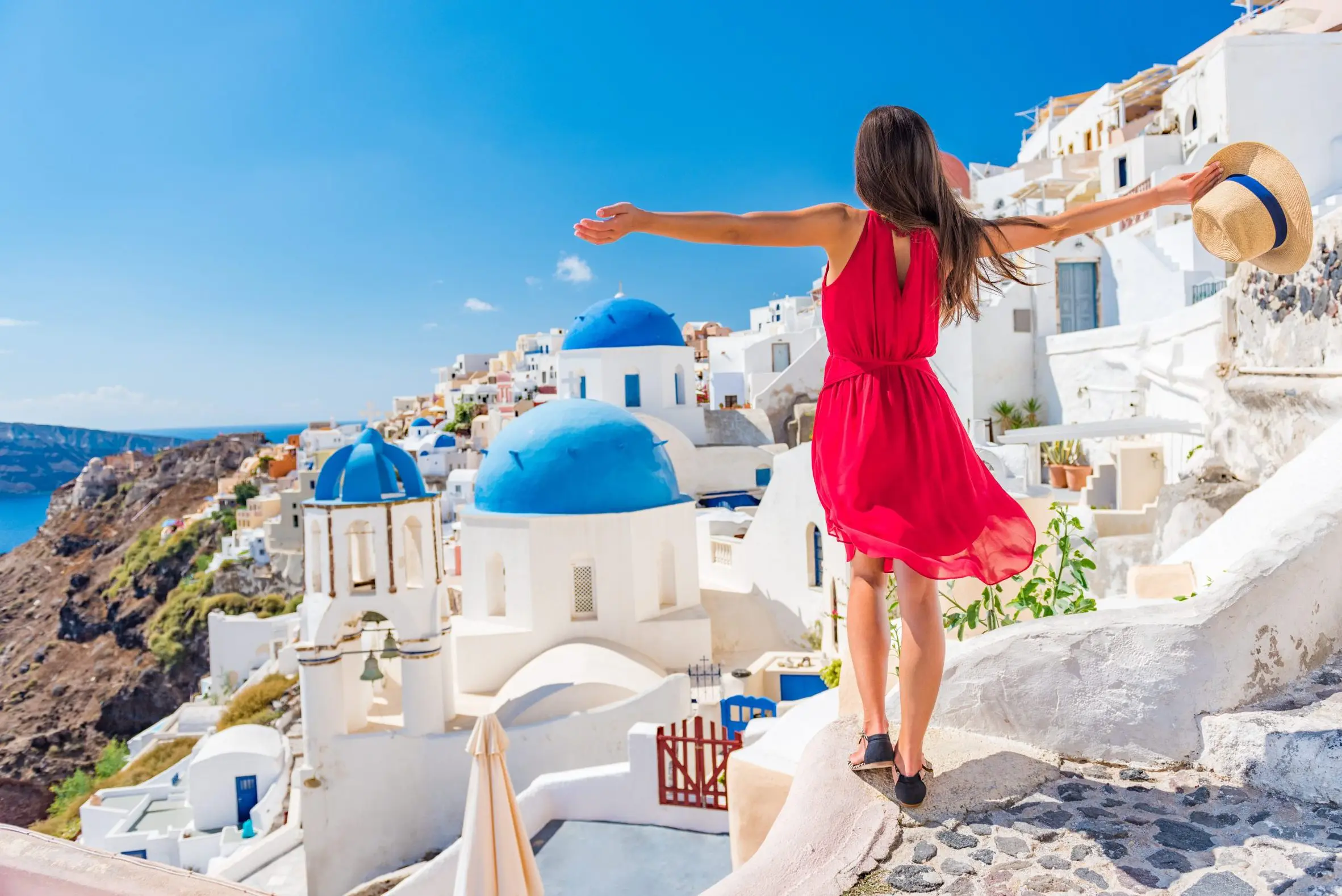 Greece Trips : Save 45%
Greece Trips : Save 45% 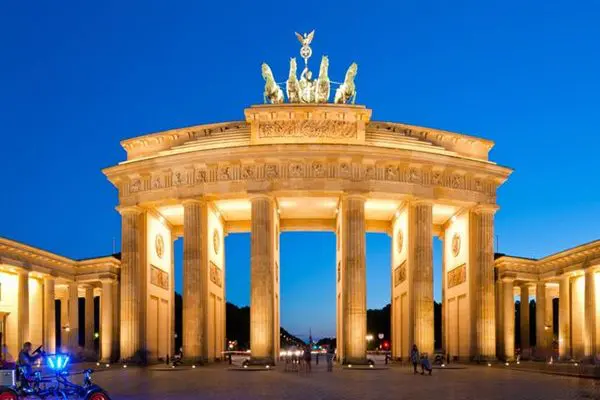 Central & Eastern Europe Tours: 45% Off
Central & Eastern Europe Tours: 45% Off 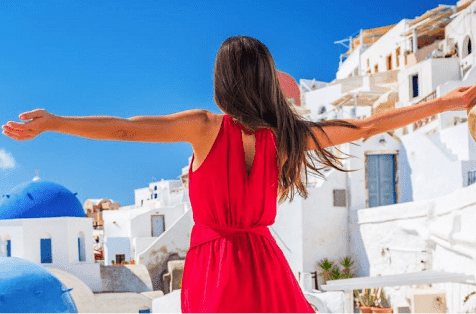 Why Travel Talk
Why Travel Talk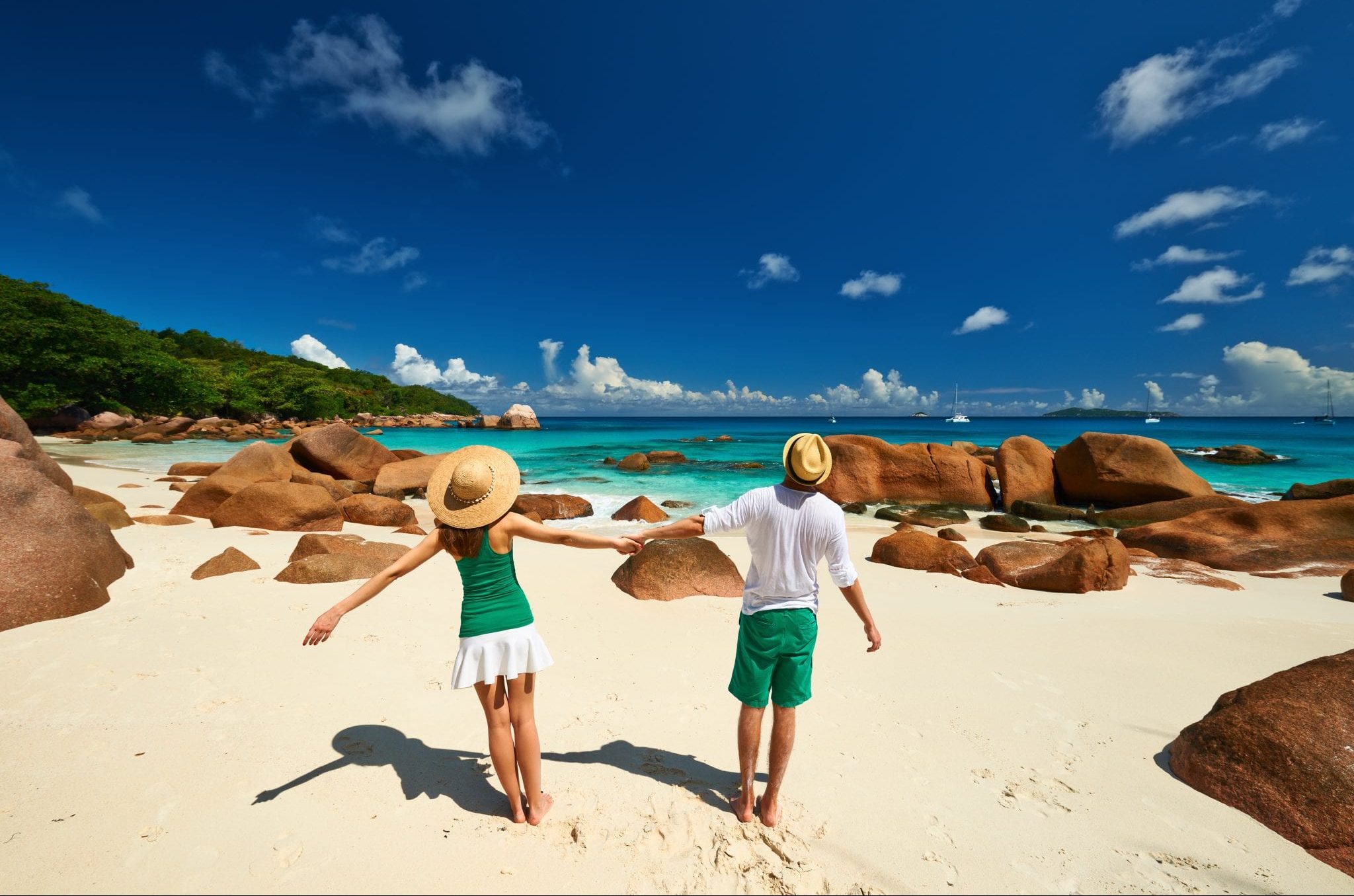 Travel Talk Blog
Travel Talk Blog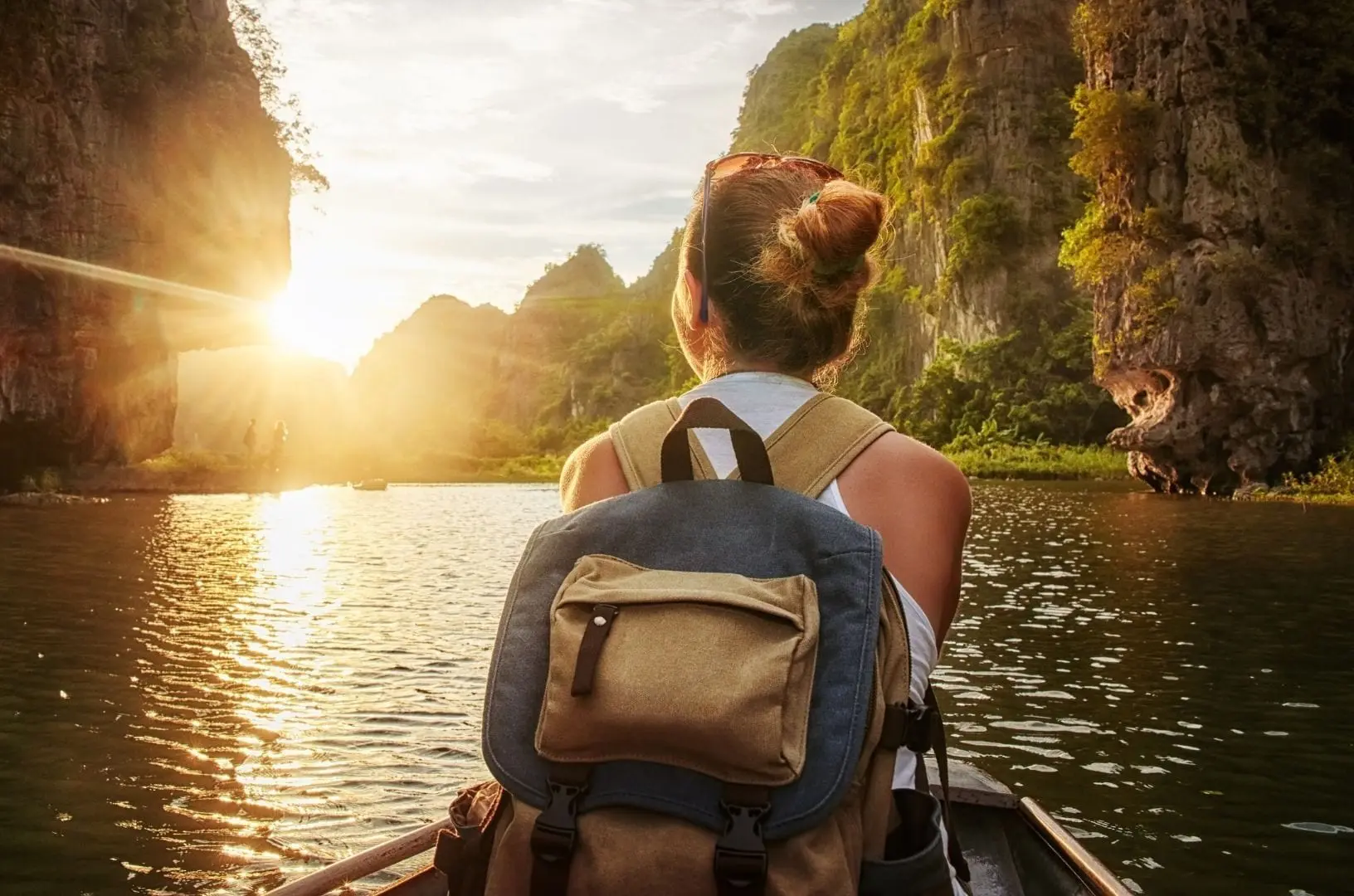 Responsible Travel
Responsible Travel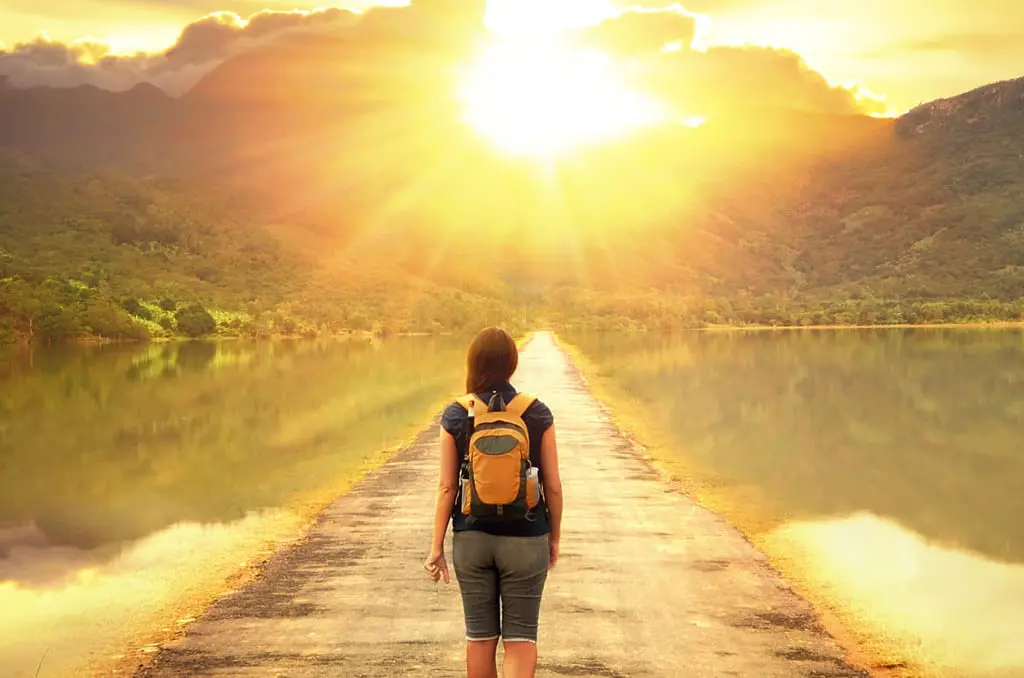 Fair Travels with Travel Talk
Fair Travels with Travel Talk